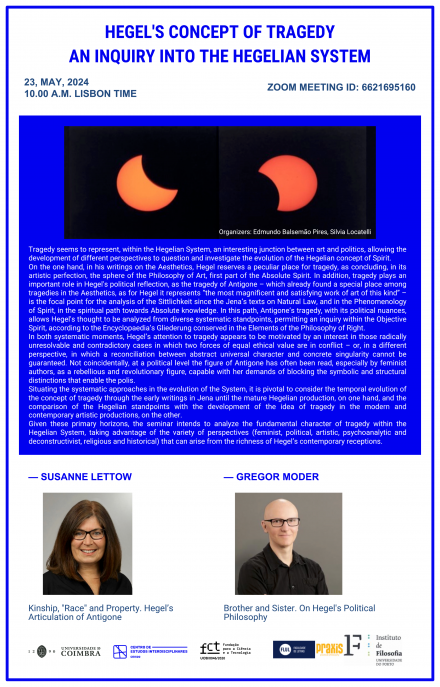Advanced Studies Seminar Series
Hegel's concept of Tragedy – An Inquiry into the Hegelian System
Tragedy in Hegel's philosophy represents a critical intersection of art and politics, crucial for understanding his concept of Spirit. Hegel views tragedy, particularly in his Aesthetics, as a culmination of the Philosophy of Art, and highlights the tragedy of Antigone as a key work for its ethical and political implications. Antigone's conflict, embodying irresolvable ethical dilemmas, illustrates the clash between universal principles and individual actions.
This seminar aims to explore the role of tragedy in Hegel's system, from his early Jena writings to his mature works, and examines its contemporary relevance through various perspectives including feminist, political, and psychoanalytic interpretations.

In particular, the seminar will evolve around the following topics:
• The aesthetical-political category of the tragic between the Jena essay On the Scientific Ways of Treating Natural Law and the Elements of the Philosophy of Right – perspectives from within Hegel’s evolution;
• Citizenship and Brotherhood in Hegel’s account of the Antigone from the Phenomenology of Spirit to the Elements of the Philosophy of Right;
• The evolution of the western Family, gender roles and Hegel’s standpoint on Aristotle’s Politics, book I, along §§ 158-180 of the Elements of the Philosophy of Right;
• Ancient and modern Tragedy – historical-aesthetical views from the Schlegel brothers, F. Schiller, F. Hölderlin, Schelling and Hegel;
• Hegel’s aesthetic value of tragedy today, in the modern world, after the falling apart of the Greek world under the weight of its own contradictions;
• Feminist contemporary readings of the Antigone and Hegel’s Tragödie im Sittlichen;
• Psychoanalysis, Deconstruction, and Hegel on “Family Complexes”;
• Hegel’s use of the political-religious concept of the feminine Piety (Pietät);
• The Tragical and the Comical in Hegel’s interpretation of the Greek concept of Fate;
• “Der Geist ist höher als die Natur“ – Hegel’s earlier views on the System’s architecture and the situation of the sexual difference between nature and ethical roles;
• Tragedy as a conflict between civil institutions and religious values. An inquiry into Antigone’s relation with Hegel’s Philosophy of Religion.
Scientific Committee: Edmundo Balsemão Pires (CEIS20/FLUC/DFCI), Silvia Locatelli (CF/UL), Cláudio Carvalho (IF/UP), Joana Ricarte (IJ/CEIS20).
Institutional Support: CEIS20, Center of Philosophy of the University of Lisbon (CFUL), Faculty of Arts and Humanities of the University of Coimbra, Instituto de Filosofia-Universidade do Porto, Instituto Júridico da Universidade de Coimbra e Fundação para a Ciência e a Tecnologia.

